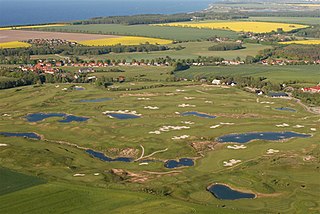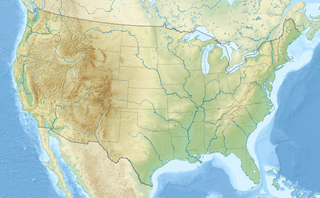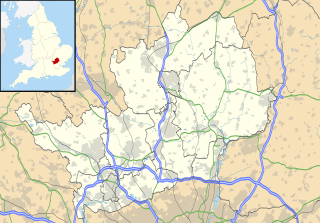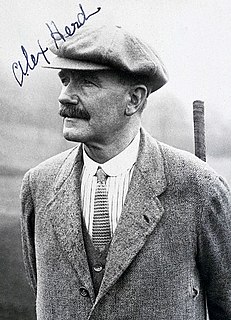Match play is a scoring system for golf in which a player, or team, earns a point for each hole in which they have bested their opponents; as opposed to stroke play, in which the total number of strokes is counted over one or more rounds of 18 holes. In match play the winner is the player, or team, with the most points at the end of play.

A golf course is the grounds where the game of golf is played. It comprises a series of holes, each consisting of a teeing ground, a fairway, the rough and other hazards, and a green with a flagstick ("pin") and hole ("cup"). A standard round of golf consists of 18 holes. Most courses contain 18 holes; some share fairways or greens, and a subset has nine holes, played twice per round. Par-3 courses consist of nine or 18 holes all of which have a par of three strokes.
The following is a glossary of the terminology currently used in the sport of golf. Where words in a sentence are also defined elsewhere in this article, they appear in italics. Old names for clubs can be found at Obsolete golf clubs.
The Irish Open is a professional golf tournament on the European Tour. Since 2015, the Irish Open has been hosted by Rory McIlroy, and his charitable foundation is the main benefactor; the title sponsor is Dubai Duty Free.

Ángel Cabrera is an Argentine professional golfer who plays on both the European Tour and PGA Tour. He is known affectionately as "El Pato" in Spanish ("The Duck") for his waddling gait. He is a two-time major champion, with wins at the U.S. Open in 2007 and the Masters in 2009; he was the first Argentine to win either. He also lost in a sudden death playoff at the Masters in 2013.
Samuel Ryder was an English businessman, entrepreneur, golf enthusiast, and golf promoter. He originated the idea of selling garden seeds in "penny packets" and built a very successful business on the concept.
The German Open was a men's golf tournament. It was first staged in 1911 when the winner was Harry Vardon. The following year the champion was another of the Great Triumvirate of late 19th and early 20th century British golfers, John Henry Taylor. The tournament was then not played again for over a decade. It was played each year from 1926 to 1939; Percy Alliss won five times in this era, Auguste Boyer four times and Henry Cotton three.

The 33rd Ryder Cup Matches, also known as the "Battle of Brookline", were held September 24–26, 1999, in the United States at The Country Club in Brookline, Massachusetts, a suburb southwest of Boston.

The 13th Ryder Cup Matches were held November 6–7, 1959 at the Eldorado Country Club in Indian Wells, California. The United States team won the competition by a score of 8½ to 3½ points.

The 4th Ryder Cup Matches were held 26–27 June 1933 at the Southport and Ainsdale Golf Club in Southport, England. The Great Britain team won the competition by a score of 6½–5½ points, which at the time was the closest score possible other than a tie. As with the three previous events, the host team won and the series was tied at two wins each.
The 2nd Ryder Cup Matches were held at the Moortown Golf Club in Leeds, England. It was very cold, with hail and at one point heavy snow on the greens. About two thousand spectators saw America gain a narrow lead after the foursome matches before the Great Britain team won singles on the final day and thus the competition by a score of 7–5 points. George Duncan of Scotland became the first of only three British captains to lift the Ryder Cup which was given to him by Samuel Ryder who was in attendance after missing the 1927 matches.
Funnies are terms used during a game of golf to describe various achievements, both positive and negative. They are different from traditional expressions such a birdie, eagle, etc. in that they do not necessarily refer to strict scores, but to unusual events which may happen in the course of a game. They are constantly being developed and there is some variation in their interpretation and usage throughout the world.

Variations of golf are games or activities based on or similar to the game of golf, in which the player utilizes common golf skills. Some are essentially identical to golf, with only minor rules changes, while others are more distant and arguably not simple variations but distinct games. Other variations include contests or activities intended to help the player practice or reinforce skills, which may or may not have a competitive aspect. Most of the variations are played in non-professional settings, without the presence of officials and sometimes without strict adherence to official game rules. Some of the variations were created to level the playing field for players of varying skill levels to be able to compete. Often, the rules are in place to provide a structure for side-betting that is independent of the final "traditional" score.

Golf is a club-and-ball sport in which players use various clubs to hit balls into a series of holes on a course in as few strokes as possible.
Big Break Ireland was the 16th edition of the Golf Channel reality show, The Big Break. It was contested in the K Club in Straffan, County Kildare, Ireland. It premiered on September 20, 2011. The eventual winner of the show was Mark Murphy, who won $50,000 and two exemptions to European Tour events, the Trophée Hassan II and the Irish Open.
Big Break Atlantis was the 17th edition of the Golf Channel's reality show, The Big Break. It was contested at the Paradise Island Golf Course on Paradise Island, The Bahamas. It premiered on May 14, 2012.
The Roehampton Invitation Tournament was a British golf tournament played each April at the Roehampton Club from 1920 to 1935. From 1922 the tournament was played over three days. There was 36 holes of stroke play on the first day with the leading 16 players qualifying for a knock-out contest on the following two days. Except in 1920 the total prize money was £200. A challenge cup was awarded to the winner to remain the absolute property of any player who won the tournament on two occasions, not necessarily consecutive. Three players won the cup outright: Abe Mitchell, Mark Seymour and Archie Compston. The tournament was cancelled in 1936 because of "the crowded state of the fixture list".
The Glasgow Herald Tournament was a British golf tournament played at Gleneagles from 1920 to 1927. The 1920 event had prize money of £650, then the largest ever in a British tournament. From 1921 the prize money was increased further, to 1,000 guineas (£1,050), a new record. The first prize increased from £160 to £200. From 1921 the event was often called the Glasgow Herald 1000 Guineas Tournament.

The Ryder Tournament was a professional golf tournament played at Verulam Golf Club in St Albans, England and sponsored by the Samuel Ryder. The event was held just once, in 1928, and had total prize money of £500.
The PGA Assistants' Championship is a golf tournament for golf club assistant professionals. It is held by the British PGA.












